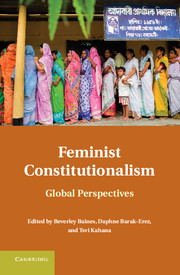Book contents
- Frontmatter
- Contents
- Foreword
- Contributors
- Introduction
- Part I Feminism as a Challenge to Constitutional Theory
- Part II Feminism and Judging
- Part III Feminism, Democracy, and Political Participation
- Part IV The Constitutionalism of Reproductive Rights
- Part V Women's Rights, Multiculturalism, and Diversity
- Part VI Women between Secularism and Religion
- 22 Secular Constitutionalism and Muslim Women's Rights
- 23 On God, Promises, and Money
- 24 Polygamy and Feminist Constitutionalism
- Index
- References
23 - On God, Promises, and Money
Islamic Divorce at the Crossroads of Gender and the Law
Published online by Cambridge University Press: 05 June 2012
- Frontmatter
- Contents
- Foreword
- Contributors
- Introduction
- Part I Feminism as a Challenge to Constitutional Theory
- Part II Feminism and Judging
- Part III Feminism, Democracy, and Political Participation
- Part IV The Constitutionalism of Reproductive Rights
- Part V Women's Rights, Multiculturalism, and Diversity
- Part VI Women between Secularism and Religion
- 22 Secular Constitutionalism and Muslim Women's Rights
- 23 On God, Promises, and Money
- 24 Polygamy and Feminist Constitutionalism
- Index
- References
Summary
Introduction
If liberalism is committed to the individual and individual choice, it is also conventionally taken to be committed to freedom and equality. Giving effects to such principles often creates tensions: the “free” acts of individuals will sometimes produce inequality; and state enforcement of equality will likely reduce individual freedom. Beyond that, despite statutory – even constitutional – guarantees of equality, systemic slants lead to gendered inequalities that almost invariably subjugate or disempower women, either individually or collectively. When faced with the claims of subordinated groups, liberalism is asked to make concessions in which these collisions intensify and multiply. In fact, if the mandate to address the rights or interests of groups is not perfectly consistent with liberalism's commitment to individuals, such group accommodation may, however, be necessary if individuals in those groups are to be treated liberally – that is, accorded liberty or equality. And the mandate to address the subordination of groups generates new collisions between liberty and equality: de facto freedom for subordinated groups may require their specific regulation, while equality of their members may require active distributions in their favor. The “politics of recognition” invoked by subordinated groups within liberalism is thus an inherently contradictory project, exposing in practice the ideals of liberty and equality as fundamentally paradoxical.
- Type
- Chapter
- Information
- Feminist ConstitutionalismGlobal Perspectives, pp. 433 - 451Publisher: Cambridge University PressPrint publication year: 2012

